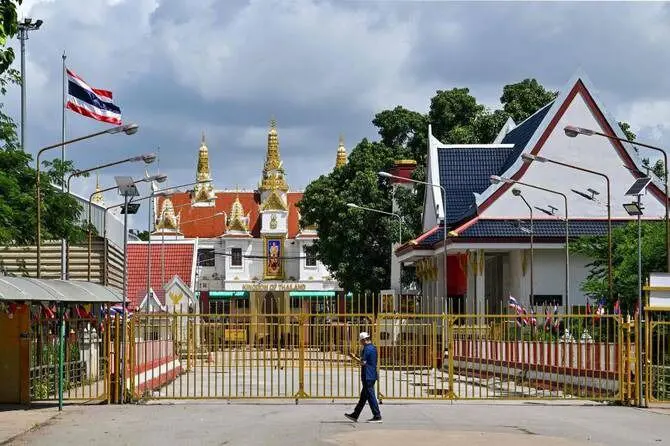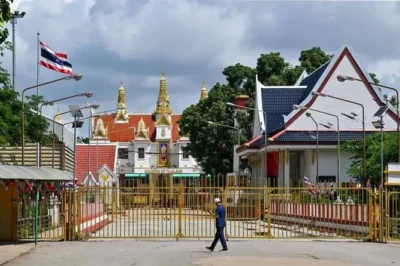
Skirmish at Emerald Triangle Ignited Alert
On May 28, 2025, soldiers from Thailand and Cambodia exchanged gunfire in a disputed border region known as the Emerald Triangle, where Thailand’s north-eastern provinces meet Cambodia and Laos. One Cambodian soldier was killed, while both nations accused the other of firing first and crossing into contested territory. This clash dramatically raised tensions along the entire 817 km land border.
Cambodia’s Rally of National Unity
In Phnom Penh on June 18, the Cambodian government organized a massive rally in support of its border troops. Tens of thousands marched, waving flags and portraits of Prime Minister Hun Manet and former leader Hun Sen, urging vigilance and solidarity. The crowd was led by Hun Many, Hun Manet’s brother. The demonstration echoed strong nationalist sentiment and reinforced Cambodia’s stance of defending sovereignty.
Cross-border Retaliation and Economic Retrenchment
Retaliatory economic and digital measures swiftly followed. Cambodia banned Thai fruit, vegetables, soap operas, and TV dramas, while suspending imports of Thai electricity, fuel, and internet bandwidth. Thailand responded by partially closing checkpoints, allowing only essential travel, mostly students, patients, and key workers, and halting tourist movements. These steps aimed to curb illicit online scams rumoured to be operating from Cambodia.
Show of Leadership on Both Sides
In early June, Thai Prime Minister Paetongtarn Shinawatra visited Chong Chom (in Surin province) and Sa Kaeo near Aranyaprathet to reassure military commanders, inspect securing operations, and meet with anxious locals. Her visit underscored a commitment to national security and tackling trans-border crime.
Meanwhile, Cambodia’s former prime minister and current Senate President Hun Sen travelled to the border in Oddar Meanchey province. In military fatigues, he met troops and officials to signal vigilance and solidarity. His presence demonstrated enduring political influence and a willingness to assert authority in the face of mounting regional tensions.
Leaked Phone Call Sparks Political Storm
Further inflaming the situation was the leak of a June 15 phone call between Paetongtarn and Hun Sen. In the recorded 17-minute conversation, the Thai PM addressed Hun Sen as “uncle,” downplayed criticism from a Thai military commander by saying “he just wants to look cool,” and urged a de-escalated, diplomatic approach. When Hun Sen released the audio on June 18, Thai nationalists reacted strongly, accusing the PM of compromising sovereignty and disrespecting the military.
The fallout was swift: the Bhumjaithai Party exited the ruling coalition, the United Thai Nation is reportedly considering similar action, and street protests have been called for June 28. Formal inquiries have been launched by Thailand’s Senate and anti-corruption bodies, and Paetongtarn has issued a public apology while pledging to stand firm on sovereignty.
Thai Government Teeters on Collapse
This crisis has coincided with an internal political meltdown in Thailand. The Bhumjaithai Party’s departure, rising criticism from coalition partners, and increased anti-government sentiment threaten to topple the government. The Democrat and Chartthaipattana parties have pledged continued support, but Paetongtarn’s survival hinges on reining in nationalists and soothing military displeasure.
Her father, former PM Thaksin Shinawatra, was ousted in a 2006 coup; his daughter now faces the spectre of political upheaval, with the possibility of a no-confidence vote, new elections, or even a military intervention looming.
Cambodia Moves to the International Court
While Thailand favours bilateral mechanisms via the 2000 Boundary Committee, Cambodia has formally referred the dispute, including areas like the Emerald Triangle and three contested temples, to the International Court of Justice (ICJ). Phnom Penh views this as a way to avoid further armed conflict. Thailand, not recognizing ICJ jurisdiction, insists on diplomatic dialogue.
Humanitarian and Local Strain
Local communities on both sides of the border are bearing the brunt of tightened security and restrictive policies. Checkpoints have reduced operational hours, triggering evacuation drills, bomb shelter construction, and daily disruptions. Farmers in Thailand’s border provinces and Cambodian merchants reliant on Thai goods are facing acute hardships.
Regional Inertia Amid Rising Risks
Although ASEAN’s consensus-driven diplomacy has so far kept the bloc on the side-lines, Malaysian Prime Minister Anwar Ibrahim has offered to mediate. Analysts warn that the lack of a robust regional response, coupled with tinderbox nationalism in both capitals, could prolong the crisis, and potentially destabilize broader Southeast Asian stability.
Conclusion
What began as a localized skirmish at the Emerald Triangle has detonated into a regional crisis straddling the realms of politics, diplomacy, economics, and security. Leadership gestures by Paetongtarn and Hun Sen, while dramatic, mask a deeper struggle over national identity, sovereignty, and strategic posture. With internal political instability and little appetite for compromise, even minor missteps could tip this flashpoint into wider confrontation. ASEAN’s muted response leaves the path forward uncertain, as both governments strive to appear strong, even as internal and external pressures fracture the foundations of bilateral trust.








































Leave a Reply